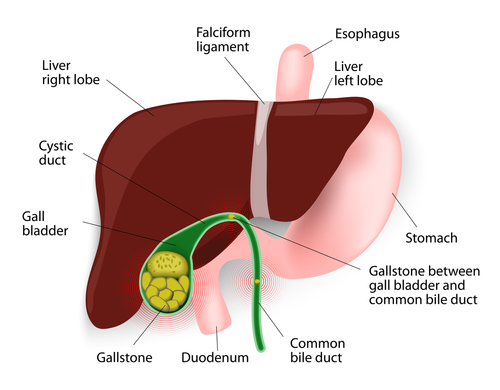For many people, the gallbladder and its purpose is a bit of a mystery. “What is it?”, “What does it do?”, “How does its health affect me?” are a few of the questions we routinely discuss with our patients. The gallbladder is in fact one of the smallest components of our digestive system. Approximately 3 inches long and 1½ inches wide in adults, a healthy gallbladder is a small part of a larger system helping the body process food effectively.
Serving as the central storage and release point for bile, a fluid made by the liver, the gallbladder assists in digestion by releasing bile to help break down fats found in food. Normally, bile moves smoothly through the digestive system. When the gallbladder forms solid, crystalized gallstones blocking the ducts within the digestive system, however, bile cannot move freely from the gallbladder to other organs, and pain, discomfort or other symptoms can arise. In these cases when a painful gallbladder attack occurs, it may be a singular event or multiple attacks may occur. Unfortunately, once gallstones are detected it is very common for additional gallstones to form and cause ongoing pain.
Surgical Treatment of the Gallbladder
Especially in the case of recurring painful attacks, it may be advisable to surgically remove the gallbladder. Even with its minor role in the body’s digestive system, it appears that the contribution of a healthy gallbladder to the overall digestive process is minimal. When the gallbladder is removed, the liver is still able to distribute the bile it manufactures to other components of the digestion system without interruption. This is why removal of the gallbladder, for a vast majority of patients, presents little or no negative effects.
In most cases, laparoscopic surgery is used to access and remove the gallbladder. As we described in the blog post What is Minimally Invasive Surgery? , laparoscopic surgery is a minimally invasive technique using small keyhole incisions to provide access for a laparoscope to view the exact surgical site. This enables surgeons to precisely treat and remove troublesome issues affecting the body. Depending on a patient’s current health, prior surgeries and other factors, it may be necessary to surgically treat the gallbladder via open, more invasive surgery.
What This Means For You
Your surgeon is the best resource to discuss which surgical option is best for you. At the same time, it’s important for you to be an informed patient and feel comfortable asking any questions needed to fully understand your options. Dr. Robert Howard, Dr. Thomas Beetel, and Dr. Joseph Levan all provide surgical care of the gallbladder at Spring Ridge Surgical Specialists. To seek a consultation with one of our surgeons, make an appointment by CLICKING HERE.
– SRSS

